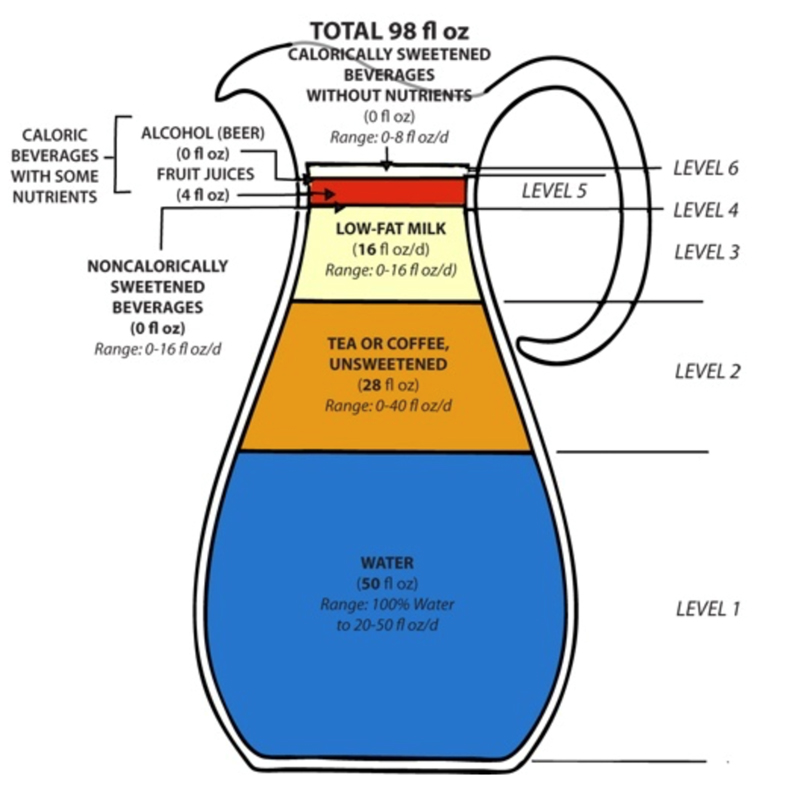Federated Health Charities’ mission is to improve the health and quality of life of Ontarians. We believe education and prevention are key parts of this. Check out our latest Health Hint on the importance of hydration!
Why Is Hydration Important?
Your body is composed of up to 60% water. This means water is vital to maintaining your regular bodily functions like digesting food, delivering nutrients to cells, regulating body temperature, keeping joints lubricated, maintaining skin elasticity, and even preventing infections. Good hydration has positive effects on your sleep quality, cognition, and even your mood. When you stay hydrated, you body has an easier time producing bodily fluids like saliva, sweat, and mucous membranes which facilitate the proper functioning of your body.
What Causes Dehydration?
Eating foods high in salt, sugar, protein, or soy require more water during digestion and can leave you dehydrated afterwards. Deli meats are often cured in salt and some shelf-stable foods have added sodium, so check the salt content of your foods to better understand their effects on your hydration. Drinking too much alcohol is a common way to lose too much water and exercising vigorously or performing manual labor, especially in hot sunny weather, can easily lead to dehydration. You can become dehydrated from symptoms of an illness like diarrhea, vomiting, sweating, or fever.

What Happens When You Are Dehydrated?
The easiest sign you may be dehydrated is dark coloured, strong-smelling urine. Symptoms of minor dehydration include passing urine less often than usual, feeling tired, dry mouth, and feeling thirsty, lightheaded, and tired.
Hydration is important for your heart health because losing water means you also lose blood volume, which causes your blood to become thicker. Thick blood is harder for your heart to pump which means your heart rate can increase when you are dehydrated. Similarly, it can also lead to higher blood pressure because your veins become constricted without enough water.
More severe symptoms of dehydration can include frequent headaches, muscle weakness, reduced kidney function, constipation, and dry, flaky skin. If you overdo exercise or manual labor in hot weather, you could even suffer from heat stroke!
Tips to Stay Hydrated
It is recommended that women drink 9 cups of water a day and men drink 12 cups of water a day. The amount you need to drink depends on the outdoor temperature, your exercise levels, and other factors like medication you may be taking. For more guidelines on the amount you should drink, take a look at the recommendation from the Dieticians of Canada.
Many fruits and even vegetables are composed of over 50% water – these include: Cucumbers, tomatoes, zucchini, melon, spinach, strawberries, broccoli, peaches, and pineapples. Its common for 20% of your recommended water intake to come from your food.
Practice good habits throughout the day to ensure you get enough water. These include: drinking a cup of water when you wake up, drinking water before each meal, and drinking a glass of water in the evening to keep you hydrated while you sleep. It’s important to drink water before you exercise, not just during or after. This ensures your body starts with enough water before it starts losing any through perspiration. Since there is a great variety of beverages you can chose from, Harvard School of Public Heath has an excellent guide to the quantities of different beverages you can drink to stay adequately hydrated – take a look at the article here. To summarize, you should try to emulate the beverage ratios displayed in this pitcher graphic. Half of your daily fluid intake should come from water. About 30% can come from unsweetened teas and coffee and 15% from milk. That leaves only 5% for sweetened drinks.

To maintain your health, do your best to incorporate adequate amounts of water into your day. Remember, drinking too much water can actually lead to negative health effects so try to stay balanced in your approach to healthy hydration.
We hope you’ve enjoyed our latest Health Hint!
Written by Jennifer Nemcik
NOTE: This article is intended to provide general health tips based on available research. You should consult with a health care professional for specific medical and dietary instructions that are right for you.
REFERENCES
https://www.heart.org/en/healthy-living/fitness/fitness-basics/staying-hydrated-staying-healthy
https://www.nhsinform.scot/illnesses-and-conditions/nutritional/dehydration
https://theheartfoundation.org/2018/11/02/your-heart-rate/
https://www.hsph.harvard.edu/news/hsph-in-the-news/the-importance-of-hydration/
https://www.unlockfood.ca/en/articles/water/facts-on-fluids-how-to-stay-hydrated.aspx






